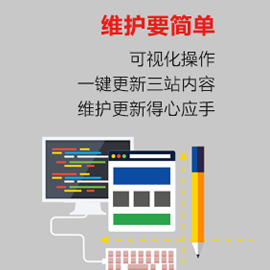C#多線程ThreadPool線程池詳解
簡單說明一下:
"熱情、務(wù)實(shí)、專業(yè)、創(chuàng)新”我們不忘初心,砥礪前行,實(shí)在做人,認(rèn)真做事,始終如一的專注企業(yè)互聯(lián)網(wǎng)品牌建設(shè)與網(wǎng)絡(luò)營銷推廣服務(wù)。成都品牌網(wǎng)站建設(shè)本著讓客戶滿意的目標(biāo),幫助企業(yè)通過互聯(lián)網(wǎng)創(chuàng)造價(jià)值.創(chuàng)新互聯(lián)公司全體員工將通過不懈努力,力爭成為客戶在信息化領(lǐng)域中值得長期信賴的合作伙伴。
線程池可以看做容納線程的容器;一個(gè)應(yīng)用程序最多只能有一個(gè)線程池;ThreadPool靜態(tài)類通過QueueUserWorkItem()方法將工作函數(shù)排入線程池; 每排入一個(gè)工作函數(shù),就相當(dāng)于請求創(chuàng)建一個(gè)線程;
線程池的作用:
1、線程池是為突然大量爆發(fā)的線程設(shè)計(jì)的,通過有限的幾個(gè)固定線程為大量的操作服務(wù),減少了創(chuàng)建和銷毀線程所需的時(shí)間,從而提高效率。
2、如果一個(gè)線程的時(shí)間非常長,就沒必要用線程池了(不是不能作長時(shí)間操作,而是不宜。),況且我們還不能控制線程池中線程的開始、掛起、和中止。
一些使用例子:
實(shí)例一:
using System;
using System.Collections.Generic;
using System.Linq;
using System.Text;
namespace ThreadPoolDemo
{
class Program
{
static void Main(string[] args)
{
System.Threading.ThreadPool.QueueUserWorkItem(new System.Threading.WaitCallback(TestThreadPool),new string[] {"drsw","sfs","sdfs"});
Console.ReadKey();
}
public static void TestThreadPool(object state)
{
string[] arry = state as string[]; //傳過來的參數(shù)值
int workerThreads = 0;
int completionPortThreads = 0;
System.Threading.ThreadPool.GetMaxThreads(out workerThreads, out completionPortThreads);
Console.Write(DateTime.Now.ToString() + "--" + arry[0] + "----workerThreads=" + workerThreads + "----completionPortThreads=" + completionPortThreads);
}
}
}
上述代碼運(yùn)行結(jié)果:

使用例子二:
using System;
using System.Collections.Generic;
using System.Linq;
using System.Text;
namespace ThreadPoolDemo
{
class Program
{
static void Main(string[] args)
{
System.Threading.ThreadPool.QueueUserWorkItem(new System.Threading.WaitCallback(TestThreadPool));
Console.ReadKey();
}
public static void TestThreadPool(object state)
{
int workerThreads = 0;
int completionPortThreads = 0;
System.Threading.ThreadPool.GetMaxThreads(out workerThreads, out completionPortThreads);
Console.Write(DateTime.Now.ToString() + "----workerThreads=" + workerThreads + "----completionPortThreads=" + completionPortThreads);
}
}
}
上述代碼運(yùn)行結(jié)果:

以上就是本文的全部內(nèi)容,希望對(duì)大家的學(xué)習(xí)有所幫助,也希望大家多多支持創(chuàng)新互聯(lián)。
文章名稱:C#多線程ThreadPool線程池詳解
轉(zhuǎn)載來源:http://www.chinadenli.net/article30/gghipo.html
成都網(wǎng)站建設(shè)公司_創(chuàng)新互聯(lián),為您提供云服務(wù)器、外貿(mào)建站、電子商務(wù)、Google、網(wǎng)站設(shè)計(jì)、網(wǎng)站制作
聲明:本網(wǎng)站發(fā)布的內(nèi)容(圖片、視頻和文字)以用戶投稿、用戶轉(zhuǎn)載內(nèi)容為主,如果涉及侵權(quán)請盡快告知,我們將會(huì)在第一時(shí)間刪除。文章觀點(diǎn)不代表本網(wǎng)站立場,如需處理請聯(lián)系客服。電話:028-86922220;郵箱:631063699@qq.com。內(nèi)容未經(jīng)允許不得轉(zhuǎn)載,或轉(zhuǎn)載時(shí)需注明來源: 創(chuàng)新互聯(lián)

- 做網(wǎng)站優(yōu)化時(shí)要注意關(guān)鍵詞布局的幾個(gè)原則 2023-04-05
- 網(wǎng)站建設(shè)之公司做網(wǎng)站的關(guān)鍵因素 2021-10-24
- 怎么做網(wǎng)站才能實(shí)現(xiàn)網(wǎng)站自身應(yīng)有的價(jià)值 2016-08-29
- 做網(wǎng)站域名注冊的坑,這些你應(yīng)該知道 2016-09-10
- 做網(wǎng)站優(yōu)化時(shí)要注意不要過度 2021-07-10
- 做網(wǎng)站seo的5大優(yōu)勢 2021-04-12
- 解析做網(wǎng)站如何分工才能達(dá)到高效率 2022-07-16
- 為公司做網(wǎng)站的流程是怎樣的? 2021-12-27
- 模板建站的不足之處在這里,做網(wǎng)站之前請了解清楚 2022-05-23
- 做網(wǎng)站什么問題經(jīng)常被咨詢 2022-10-03
- 網(wǎng)站中用戶體驗(yàn)的四大特性 2016-12-24
- 做網(wǎng)站你是選擇價(jià)格還是選擇性能 2020-09-27